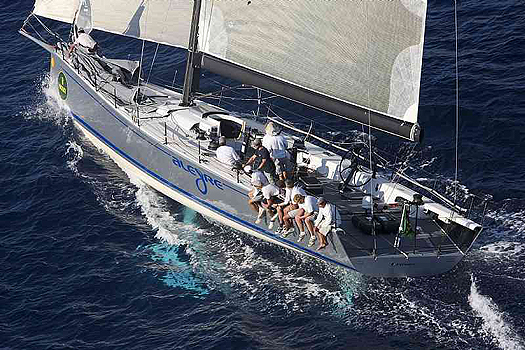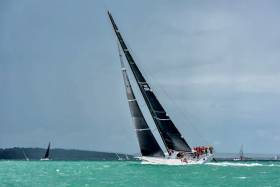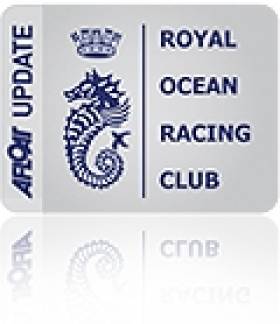Displaying items by tag: RORC Channel Race
There's Life in IRC Yet as Rambler 88 Takes RORC Channel Race - With Sights Now Set On Fastnet
#Rambler88 - Last weekend’s RORC Channel Race has clearly demonstrated two things writes W M Nixon. Firstly, the way that George David’s hugely impressive Rambler 88 won the Volvo Round Ireland race 2016 every which way was no flash in the pan. Until Rambler 88 came along, line honours and the Corrected Time overall win were thought well-nigh impossible of achievement. Yet now the big silver bullet has done it in Wicklow’s Round Ireland, in the RORC’s Cowes-Dinard/St Malo race, and now she’s done it yet again in the RORC Channel Race.
The second Big Thing which has been demonstrated is that in RORC racing, the IRC is working mighty well. On Corrected Time, Rambler 88 was first, Piet Vroon’s Ker 51 Tonnere 4 was second, and the French two-handed JPK 10.10 Night & Day (Pascal Loison) was third. Night & Day incidentally also won out in the 2013 Rolex Fastnet Race in the same two-handed configuration, so she’s some boat and some crew. But as we read on through tho official report, what emerges most obviously is the incredible spread of successful boats, and the tiny time margins between them. There’s life in the IRC yet……
Days after winning the King Edward VII Cup in this year’s Cowes-Dinard-St Malo Race, David’s Rambler 88 has made it two in a row with victory in the 2017 RORC Channel Race.
The American Maxi took line honours and was the overall winner in the 160nm, 109-boat race at the weekend — the last stage in the RORC Season's Points Championship before the Rolex Fastnet Race from Sunday 6 August.
“We wanted to race in good breeze, and we certainly got that in this race,” said Rambler 88’s project manager Mick Harvey, who added that the race around the Isle of Wight “has been a good build up to the Fastnet, which is the big event for us.”
Former Fastnet podium finishers have shared their secrets for success in the world’s biggest offshore race, as previously reported on Afloat.ies previously reported on Afloat.ie.
RORC Channel Race Preview
This Saturday morning sees the start of the last RORC offshore race prior to the Rolex Fastnet Race in August. It is the last RORC race for competitors to tune themselves, their equipment and their yachts prior to this year's big event. However, this is more than just a dress rehearsal. The Channel Challenge Cup is the overall prize as are vital points scored for the RORC Season's Points Championship. Even at this late stage in the series, many classes still hang very much in the balance. It could be a tricky weekend with light airs racing a very high probability.

In IRC Zero, Derek Saunders' CM 60, Venomous, was the class winner for the Channel Race last year and a good result this weekend should see the team move to first in class for this season. However, Venomous has some highly accomplished opposition. Andres Soriano's Mills 68, Alegre, and Johnny Vincent's TP52, Pace, have been campaigning at prestigious events in the Mediterranean all year and will be very much up to speed. Jens Kuehne's RP 48, Sjambok, may well enjoy being the lowest rated boat in the class. Alex Thompson's IMOCA 60, Hugo Boss, is joining the big boat class and will also be racing in the Two-Handed Class.
IRC One has fourteen yachts entered, including the current top four yachts in this class for the championship. Piet Vroon's Ker 46, Tonnerre de Breskens, will be hoping that their recent mainsail re-design will go well in the light and Jonathan Goring's Ker 40, Keronimo, is also yet to be race tested in gentle breeze. Chaz Ivill's Grand Soleil 54, John B, won its class in last year's race and won't be giving up without a fight. The predicted light weather may not suit the three Farr 65s entered by Ondeck but it is a welcome sight to have the yachts returning to RORC Racing after competing in this year's RORC Caribbean 600.
In IRC Two RORC Commodore Andrew McIrvine's First 40, La Réponse, is the current class leader and also won last year's Channel Race Overall. "I was delighted to see that 98 yachts had entered for the Channel Race, especially as like me, many of the competitors have so many other commitments away from sailing. Many of the yachts entered will be looking for a final shakedown before the Rolex Fastnet Race and as we have had a very windy season of racing, I think that it is very useful to race in what looks like light conditions. This should give all of us practice in a mode of racing that we have hardly experienced at all this season."
Two yachts vying for the IRC Two title may well be looking forward to a light airs race. Niall Dowling's J/111, Arabella, competes for the eighth time this season and currently lies second in class for the championship. Neil Kipling's J/122, Joopster, is fourth but should move up to third with a decent result this weekend. Both of these designs are light displacement with a sail configuration that may well enjoy the predicted weather.
Peter Rutter's Quokka 8 had a magnificent run in this month's IRC National Championship, taking a clean sweep of eight bullets. For the Channel Race the Grand Soleil 43 will be skippered by Philippe Falle and sailed by Sailing Logic. The yacht racing school has no less than five yachts racing including Visit Malta Puma, skippered by Tim Thubron which is currently third overall for the season.
Twenty two yachts are entered for IRC Three including current class leader Nick Martin's J/105, Diablo - J. Peter Olden's A 35, Solan Goose of Hamble, will be looking for a good result to move up from third overall and also to defend last year's class win in the Channel Race. Both of these yachts are very much in contention for the Two-Handed title. Last year's Channel Race saw just three teams sailing short handed, this increasingly popular discipline has attracted 22 yachts for the 2011 RORC Channel Race
The largest class racing this weekend is IRC Four with 28 yachts set to race. The class leader for the season is Matthias Kracht's JPK 9.60, Ultreia!, which also leads the Two-handed Class. Ultreia! has a commanding lead for the season. IRC Four is producing some extremely close racing and probably the most competitive division racing with RORC this season; the top ten yachts are all still capable of winning the class.
In sharp contrast to a season of high wind speed and adrenalin pumping sailing this weekend's RORC Channel Race could be a very different affair. However for many crews, light air spinnakers and headsails may not have seen too much UV light this season. The Channel Race is a golden opportunity for teams to excel at a different point in the yacht racing spectrum. To achieve the result that is hoped for, concentration levels will need to be as high as possible.
Closing Date for competitors in the 2011 RORC Channel Race was Thursday, 21st July. Late entries are possible until Friday, 29th July.































































